Unit 12 第3课时(Section A Grammar Focus-3c) (同步课件)-七年级英语下册同步精品课堂(人教版)
文档属性
| 名称 | Unit 12 第3课时(Section A Grammar Focus-3c) (同步课件)-七年级英语下册同步精品课堂(人教版) | 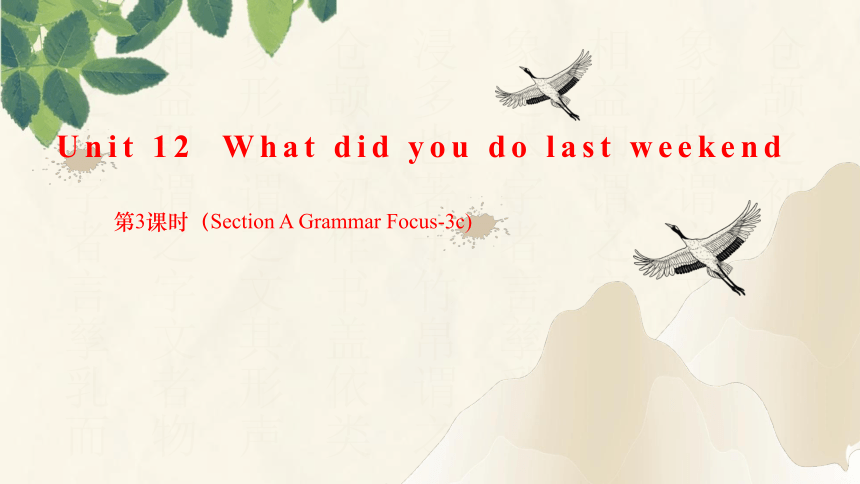 | |
| 格式 | pptx | ||
| 文件大小 | 13.0MB | ||
| 资源类型 | 试卷 | ||
| 版本资源 | 人教新目标(Go for it)版 | ||
| 科目 | 英语 | ||
| 更新时间 | 2024-04-14 12:15:46 | ||
图片预览

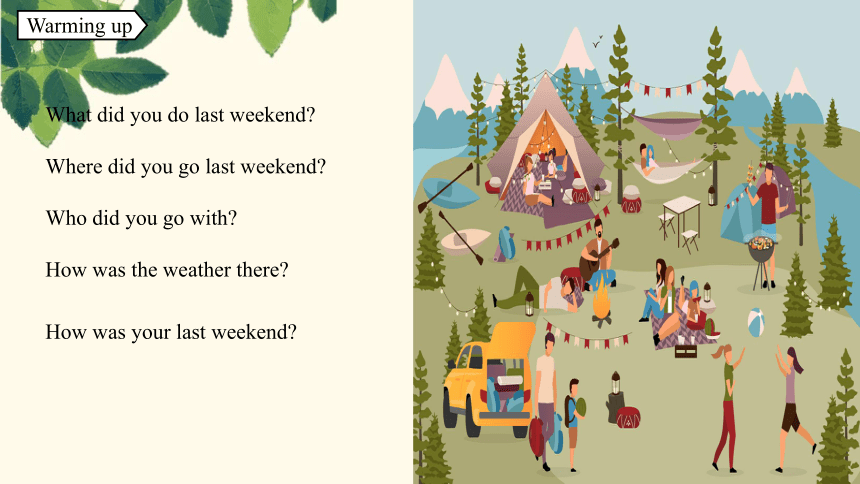
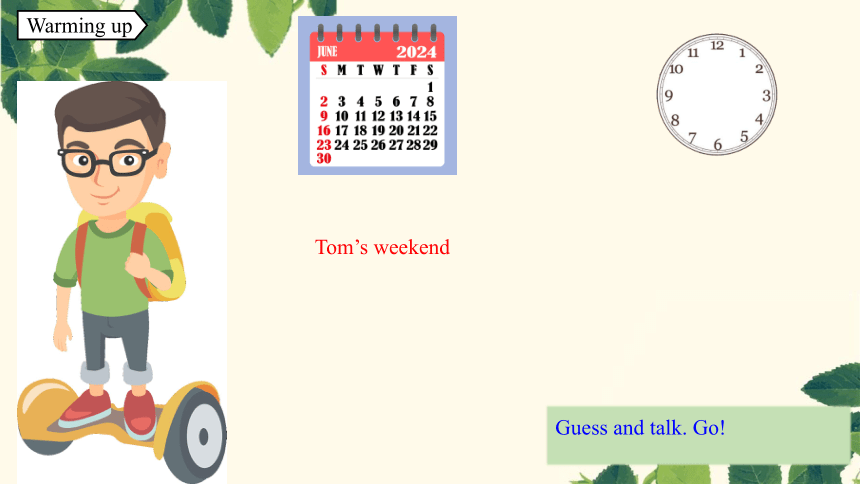
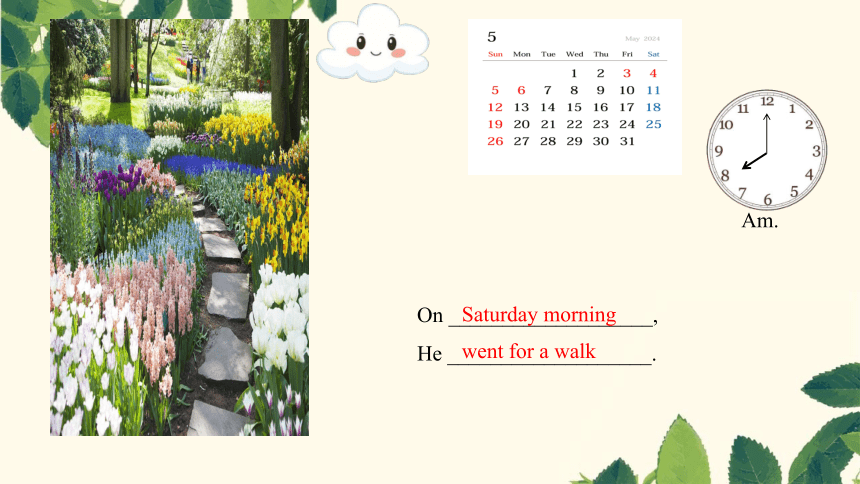
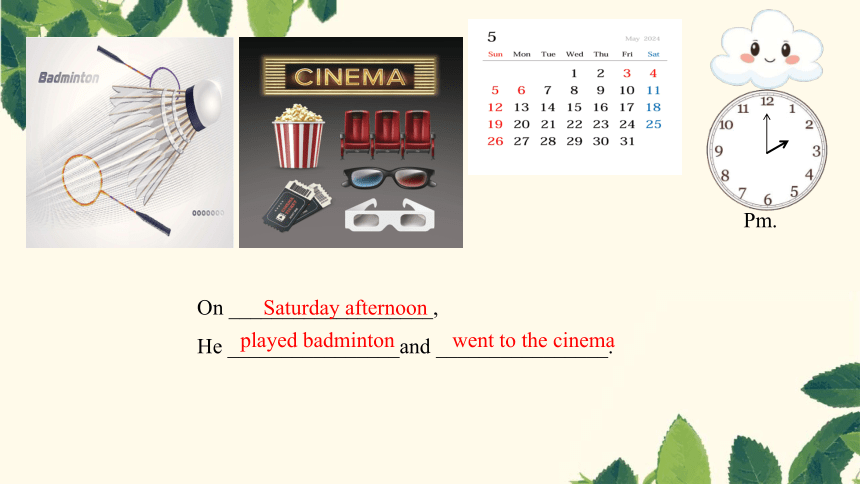
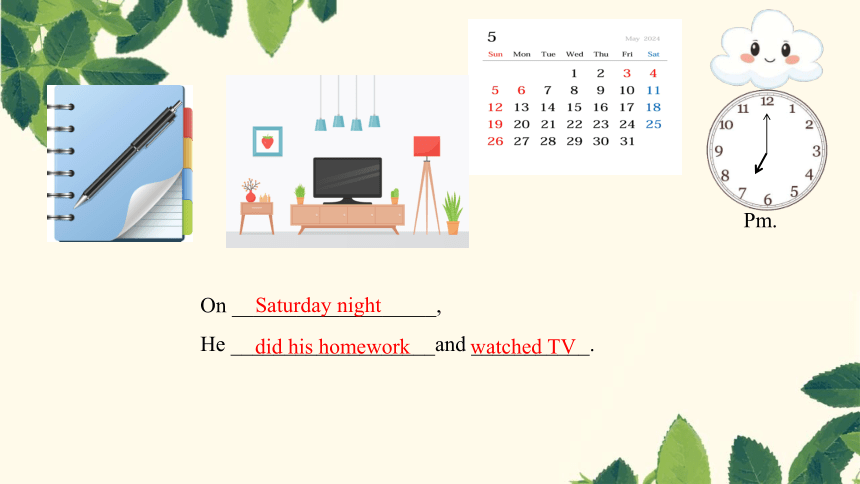
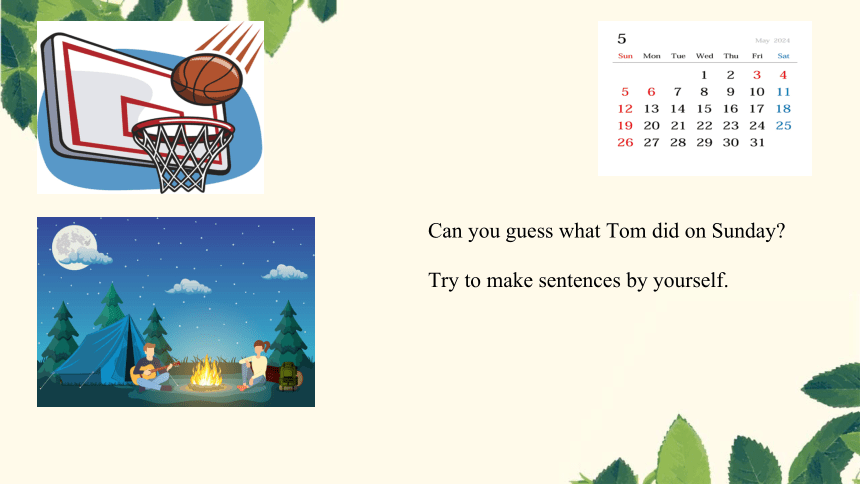
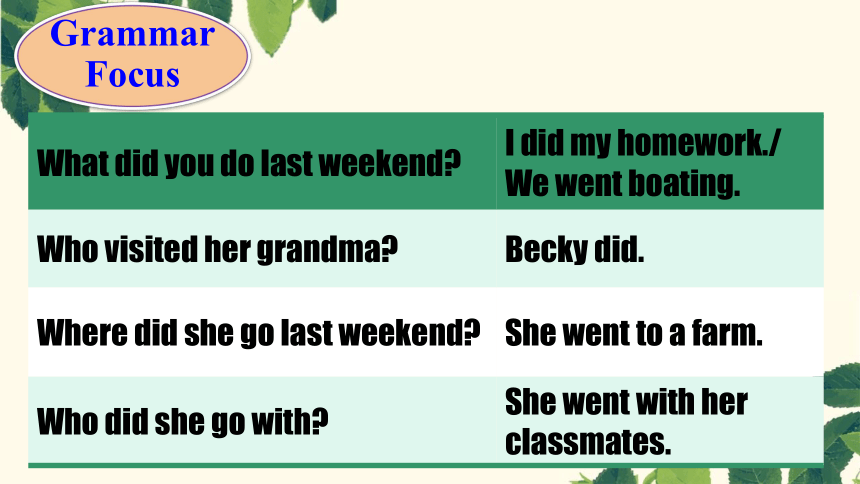
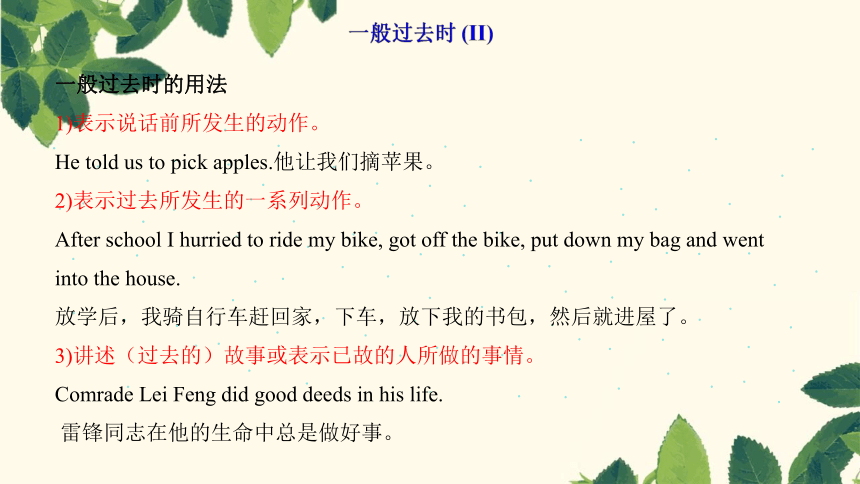
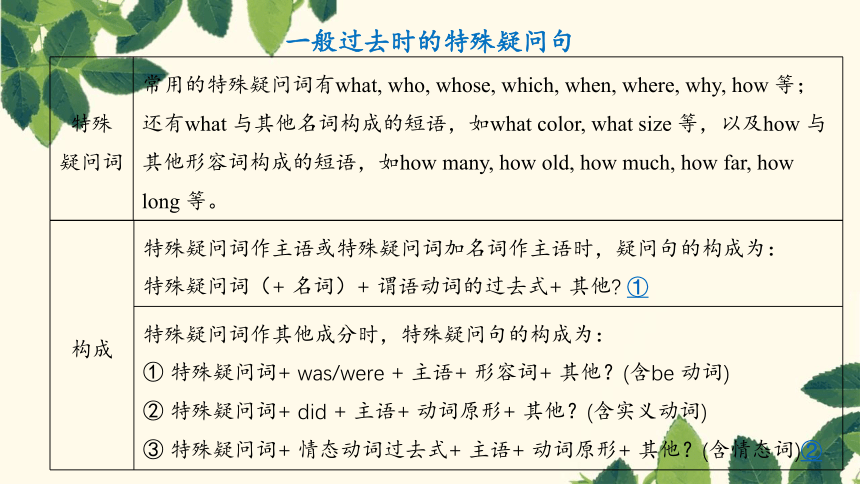
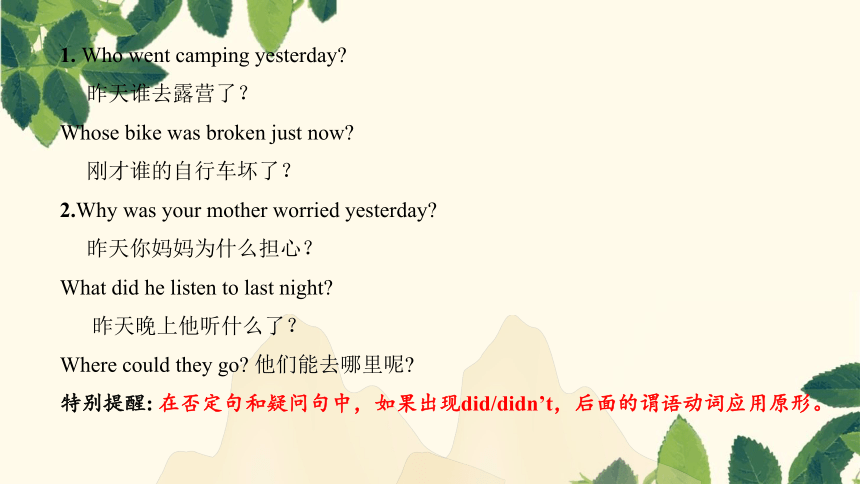
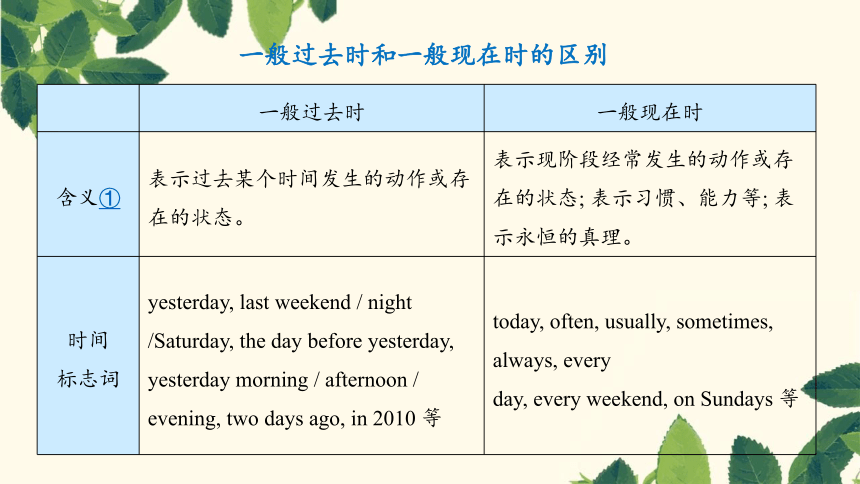
文档简介
(共31张PPT)
仓颉之初作书盖依类象形故谓之文其形声相益即谓之字文者物象之本字者言孳乳而浸多也著于竹帛谓之仓颉之初作书盖依类象形故谓之文其形声相益即谓之字文者物象之本字者言孳乳而
Unit 12 What did you do last weekend
第3课时(Section A Grammar Focus-3c)
What did you do last weekend
Where did you go last weekend
Who did you go with
How was the weather there
How was your last weekend
Warming up
Tom’s weekend
Guess and talk. Go!
Warming up
Am.
On ___________________,
He ___________________.
Saturday morning
went for a walk
Pm.
On ___________________,
He ________________and ________________.
Saturday afternoon
played badminton
went to the cinema
Pm.
On ___________________,
He ___________________and ___________.
Saturday night
did his homework
watched TV
Can you guess what Tom did on Sunday
Try to make sentences by yourself.
What did you do last weekend I did my homework./ We went boating.
Who visited her grandma Becky did.
Where did she go last weekend She went to a farm.
Who did she go with She went with her classmates.
Grammar
Focus
.
.
.
.
.
.
.
.
.
.
.
.
.
.
.
.
.
.
.
.
.
.
.
.
.
.
.
.
.
.
.
.
.
.
.
.
.
.
.
.
.
.
.
.
.
.
.
.
.
.
.
.
.
.
.
.
.
.
.
.
.
.
.
.
.
.
.
.
.
.
.
.
.
.
.
.
.
.
.
.
.
.
.
.
.
.
.
.
.
.
.
.
.
.
.
.
.
.
.
一般过去时的用法
1)表示说话前所发生的动作。
He told us to pick apples.他让我们摘苹果。
2)表示过去所发生的一系列动作。
After school I hurried to ride my bike, got off the bike, put down my bag and went into the house.
放学后,我骑自行车赶回家,下车,放下我的书包,然后就进屋了。
3)讲述(过去的)故事或表示已故的人所做的事情。
Comrade Lei Feng did good deeds in his life.
雷锋同志在他的生命中总是做好事。
一般过去时 (II)
一般过去时的特殊疑问句
特殊 疑问词 常用的特殊疑问词有what, who, whose, which, when, where, why, how 等;还有what 与其他名词构成的短语,如what color, what size 等,以及how 与其他形容词构成的短语,如how many, how old, how much, how far, how long 等。
构成 特殊疑问词作主语或特殊疑问词加名词作主语时,疑问句的构成为:
特殊疑问词(+ 名词)+ 谓语动词的过去式+ 其他 ①
特殊疑问词作其他成分时,特殊疑问句的构成为:
① 特殊疑问词+ was/were + 主语+ 形容词+ 其他?(含be 动词)
② 特殊疑问词+ did + 主语+ 动词原形+ 其他?(含实义动词)
③ 特殊疑问词+ 情态动词过去式+ 主语+ 动词原形+ 其他?(含情态词)②
1. Who went camping yesterday
昨天谁去露营了?
Whose bike was broken just now
刚才谁的自行车坏了?
2.Why was your mother worried yesterday
昨天你妈妈为什么担心?
What did he listen to last night
昨天晚上他听什么了?
Where could they go 他们能去哪里呢
特别提醒: 在否定句和疑问句中,如果出现did/didn’t,后面的谓语动词应用原形。
一般过去时 一般现在时
含义① 表示过去某个时间发生的动作或存在的状态。 表示现阶段经常发生的动作或存在的状态; 表示习惯、能力等; 表示永恒的真理。
时间 标志词 yesterday, last weekend / night /Saturday, the day before yesterday, yesterday morning / afternoon / evening, two days ago, in 2010 等 today, often, usually, sometimes, always, every
day, every weekend, on Sundays 等
一般过去时和一般现在时的区别
一般过去时 一般现在时
陈述句② 肯定句: ①主语+ 动词过去式+ 其他. ②主语+ was / were + 其他. 否定句: ①主语+ didn’t + 动词原形+其他. ②主语+ wasn’t / weren’t + 其他. 肯定句:
①主语+ 动词原形/ 动词第三人称单数+ 其他.
②主语+ am/is/are + 其他.
否定句:
①主语+ don’t/doesn’t + 动词原形+其他.
②主语+ am not/isn’t/aren’t + 其他.
一般过去时 一般现在时
一般 疑问句③ ① Did + 主语+ 动词原形+ 其他? ② Was/Were + 主语+ 其他? ① Do/Does + 主语+ 动词原形+ 其他?
② Am/Is/Are + 主语+ 其他?
特殊 疑问句④ ① 特殊疑问词+ was/were + 主语+ 其他 ② 特殊疑问词+ did + 主语+ 动词原形+ 其他 ① 特殊疑问词+ am/is/are + 主语+ 其他
② 特殊疑问词+ do/does + 主语+ 动词原形+其他
1.I usually ride a bike to school, but yesterday I took a bus.
我常骑自行车去上学,但是昨天我乘坐了公共汽车。
2.She was very happy then, but now she feels sad.
那时她很高兴,但是现在她感觉难过。
Jack doesn’t like sports, and he didn’t have a P.E. class yesterday.
杰克不喜欢运动,昨天他没上体育课。
3.Did they go to the beach 5 days ago 5 天前他们去海滩了吗?
Does the boy like playing chess 那个男孩喜欢下国际象棋吗?
4.What did you do just now 刚才你做什么了?
What do you often do on weekends
周末你经常做什么?
1. A: _____ did you do last weekend
B: I played badminton on Saturday.
A: Sounds fun! _____ did you play with
B: I played with my father. He’s really good!
2. A: _____ was your weekend
B: It was great! I had so much fun!
A: _____ did you go
B: The weather was beautiful, so I went to the beach with my parents.
Fill in the blanks with who, what, when, where or how.
3a
What
How
Where
Who
3. A: _____ did Jim lose
B: He lost his keys. He often loses things.
A: That’s too bad. _____ did he lose them
B: I heard it was yesterday.
When
What
Complete the passage with the correct forms of the words in the box.
say be climb see run away
A family of mice were in the kitchen on Saturday morning when they ________ a big cat. Baby Mouse _______ afraid and ________ onto his father's back. Father Mouse shouted at the cat, “Woof, woof! ” The cat quickly ____________.
“Wow, Dad, you're good! ”________ Baby Mouse. “Well, son, that's why it's important to learn a second language , ” answered Father Mouse.
saw
was
climbed
ran away
said
3b
Think of two things you did last weekend. Draw pictures
of them. Your classmates guess what you did.
3c
These patterns may help you
Did you...
Yes, I did./No, I didn’t.
You went to the mountains!
You went shopping!
...
What did I do
You went with your daughter.
You went boating.
.
.
.
.
.
.
.
.
.
.
.
.
.
.
.
.
.
.
.
.
.
.
.
.
.
.
.
.
.
.
.
.
.
.
.
.
.
.
.
.
.
.
.
.
.
.
.
.
.
.
.
.
.
.
.
.
.
.
.
.
.
.
.
.
.
.
.
.
.
.
.
.
.
.
.
.
.
.
.
.
.
.
.
.
.
.
.
.
.
.
.
.
.
.
.
.
.
.
.
.
You went to the cinema.
.
.
.
.
.
.
.
.
.
.
.
.
.
.
.
.
.
.
.
.
.
.
.
.
.
.
.
.
.
.
.
.
.
.
.
.
.
.
.
.
.
.
.
.
.
.
.
.
.
.
.
.
.
.
.
.
.
.
.
.
.
.
.
.
.
.
.
.
.
.
.
.
.
.
.
.
.
.
.
.
.
.
.
.
.
.
.
.
.
.
.
.
.
.
.
.
.
.
.
.
You went to the beach.
.
.
.
.
.
.
.
.
.
.
.
.
.
.
.
.
.
.
.
.
.
.
.
.
.
.
.
.
.
.
.
.
.
.
.
.
.
.
.
.
.
.
.
.
.
.
.
.
.
.
.
.
.
.
.
.
.
.
.
.
.
.
.
.
.
.
.
.
.
.
.
.
.
.
.
.
.
.
.
.
.
.
.
.
.
.
.
.
.
.
.
.
.
.
.
.
.
.
.
.
You did your homework.
Language points
1. Father Mouse shouted at the cat, “Woof, woof!” 鼠爸爸冲猫大叫:“汪汪,汪汪!”
shout v. 呼叫;喊叫
shout 在此处作不及物动词,shout at意为“ 冲…… 大声叫嚷” ,at后接喊叫的对象。
There is someone shouting. 有人在大声叫喊。
Speak slowly. Don’t shout at others. 慢慢说。不要冲他人喊叫。
【易混辨析】shout at与shout to
shout at 意为“冲...... 大声叫嚷“,多指因生气或愤怒而冲着某人大声吼叫。
Li Ming’s mother shouted at him for his dishonesty.
妈妈因李明不诚实而对他大声嚷嚷。
shout to 意为“对 ..... 大声喊叫”,目的是让别人听见,多因距离远。
Mary shouted to us to come in and help her. 玛丽大声喊我们进来帮助她
2. “Well, son, that’s why it’s important to learn a second language,” answered Father Mouse. “所以嘛,儿子,这就是为什么再学一门语言很重要。”鼠爸爸回答道。
1)That’s why... 句型
该句型意为“这/那就是......的原因”,其中why引导的从句,表示结果。
Tom overslept this morning. That’s why he was late for school.
汤姆今天早晨睡过头了,这就是他上学迟到的原因。
【拓展】
“That’s because ... ”也是一 个常用句型,意为“这/那是因为 …… ”, because引导的从句表示原因。
Tom was late for school this morning. That’s because he overslept.
汤姆今天早晨上学迟到了,那是因为他睡过头了。
2)a second意为“又一;再一”。 a/an与序数词连用不表顺序,表示“再(一),又 (一)”
Tom took a second book after finishing reading the book.
看完这本后,汤姆又拿了一本书。
3)language n. 语言
language 在此是可数名词,a second language意为“又一门语言”。
表示某种具体语言的词,如 Chinese, English, Japanese 等,是不可数名词。
How many languages can you speak
你会说几门语言?
All the children must learn a foreign language.
所有的儿童必须学一门外语。
3.run away
run away 逃走;跑开. 是不及物动词短语,其后不能直接跟宾语。
其中away 是副词,意为“离开,远离”,常与run, go, walk, drive, ride 等动词搭配。run away from...“从……处跑开/ 逃离”。
away 构成的短语:
① go away 走开 ② give away 赠送 ③ take away 拿走
④ put away 把……收起来;放好
⑤ stay away from 远离
A monkey ran away from the zoo.一只猴子从动物园逃走了。
Don’t go away. I have a question to ask you. 别走开。我有个问题要问你。
Who will look after these children when I’m away 我走了之后,谁来照看这些孩子?
一、根据句意及音标或汉语提示,用单词的适当形式填空。
1.I was so surprised when all my friends (喊叫) “Happy Birthday!”.
2. My sister can speak five (语言) .
3. Look! There are so many (老鼠) in the old house.
4. We said goodbye to each other and went / we /.
5. Mum walked quietly because she didn't want to wake up her
five-month-old / be bi/.
shouted
languages
mice
away
baby
基础提能
二、根据中文提示完成句子,每空词数不限。
1.当我们正在吃晚饭时,灯熄灭了。太糟糕了!
When we were having supper, the light went out. !
2.广州是一座美丽的城市。这就是每年都有如此多的游客来这里的原因。
Guangzhou is a beautiful city. so many visitors come here every year.
3.但是我知道再学一门语言是重要的。
But I know it is important to learn .
4.不要冲你的父母喊叫。
5.两天前我和朋友们去游泳了。
How terrible
That's why
a second language
Don't shout at your parents.
I went swimming with my friends two days ago.
仓颉之初作书盖依类象形故谓之文其形声相益即谓之字文者物象之本字者言孳乳而浸多也著于竹帛谓之仓颉之初作书盖依类象形故谓之文其形声相益即谓之字文者物象之本字者言孳乳而
谢君一赏
仓颉之初作书盖依类象形故谓之文其形声相益即谓之字文者物象之本字者言孳乳而浸多也著于竹帛谓之仓颉之初作书盖依类象形故谓之文其形声相益即谓之字文者物象之本字者言孳乳而
Unit 12 What did you do last weekend
第3课时(Section A Grammar Focus-3c)
What did you do last weekend
Where did you go last weekend
Who did you go with
How was the weather there
How was your last weekend
Warming up
Tom’s weekend
Guess and talk. Go!
Warming up
Am.
On ___________________,
He ___________________.
Saturday morning
went for a walk
Pm.
On ___________________,
He ________________and ________________.
Saturday afternoon
played badminton
went to the cinema
Pm.
On ___________________,
He ___________________and ___________.
Saturday night
did his homework
watched TV
Can you guess what Tom did on Sunday
Try to make sentences by yourself.
What did you do last weekend I did my homework./ We went boating.
Who visited her grandma Becky did.
Where did she go last weekend She went to a farm.
Who did she go with She went with her classmates.
Grammar
Focus
.
.
.
.
.
.
.
.
.
.
.
.
.
.
.
.
.
.
.
.
.
.
.
.
.
.
.
.
.
.
.
.
.
.
.
.
.
.
.
.
.
.
.
.
.
.
.
.
.
.
.
.
.
.
.
.
.
.
.
.
.
.
.
.
.
.
.
.
.
.
.
.
.
.
.
.
.
.
.
.
.
.
.
.
.
.
.
.
.
.
.
.
.
.
.
.
.
.
.
一般过去时的用法
1)表示说话前所发生的动作。
He told us to pick apples.他让我们摘苹果。
2)表示过去所发生的一系列动作。
After school I hurried to ride my bike, got off the bike, put down my bag and went into the house.
放学后,我骑自行车赶回家,下车,放下我的书包,然后就进屋了。
3)讲述(过去的)故事或表示已故的人所做的事情。
Comrade Lei Feng did good deeds in his life.
雷锋同志在他的生命中总是做好事。
一般过去时 (II)
一般过去时的特殊疑问句
特殊 疑问词 常用的特殊疑问词有what, who, whose, which, when, where, why, how 等;还有what 与其他名词构成的短语,如what color, what size 等,以及how 与其他形容词构成的短语,如how many, how old, how much, how far, how long 等。
构成 特殊疑问词作主语或特殊疑问词加名词作主语时,疑问句的构成为:
特殊疑问词(+ 名词)+ 谓语动词的过去式+ 其他 ①
特殊疑问词作其他成分时,特殊疑问句的构成为:
① 特殊疑问词+ was/were + 主语+ 形容词+ 其他?(含be 动词)
② 特殊疑问词+ did + 主语+ 动词原形+ 其他?(含实义动词)
③ 特殊疑问词+ 情态动词过去式+ 主语+ 动词原形+ 其他?(含情态词)②
1. Who went camping yesterday
昨天谁去露营了?
Whose bike was broken just now
刚才谁的自行车坏了?
2.Why was your mother worried yesterday
昨天你妈妈为什么担心?
What did he listen to last night
昨天晚上他听什么了?
Where could they go 他们能去哪里呢
特别提醒: 在否定句和疑问句中,如果出现did/didn’t,后面的谓语动词应用原形。
一般过去时 一般现在时
含义① 表示过去某个时间发生的动作或存在的状态。 表示现阶段经常发生的动作或存在的状态; 表示习惯、能力等; 表示永恒的真理。
时间 标志词 yesterday, last weekend / night /Saturday, the day before yesterday, yesterday morning / afternoon / evening, two days ago, in 2010 等 today, often, usually, sometimes, always, every
day, every weekend, on Sundays 等
一般过去时和一般现在时的区别
一般过去时 一般现在时
陈述句② 肯定句: ①主语+ 动词过去式+ 其他. ②主语+ was / were + 其他. 否定句: ①主语+ didn’t + 动词原形+其他. ②主语+ wasn’t / weren’t + 其他. 肯定句:
①主语+ 动词原形/ 动词第三人称单数+ 其他.
②主语+ am/is/are + 其他.
否定句:
①主语+ don’t/doesn’t + 动词原形+其他.
②主语+ am not/isn’t/aren’t + 其他.
一般过去时 一般现在时
一般 疑问句③ ① Did + 主语+ 动词原形+ 其他? ② Was/Were + 主语+ 其他? ① Do/Does + 主语+ 动词原形+ 其他?
② Am/Is/Are + 主语+ 其他?
特殊 疑问句④ ① 特殊疑问词+ was/were + 主语+ 其他 ② 特殊疑问词+ did + 主语+ 动词原形+ 其他 ① 特殊疑问词+ am/is/are + 主语+ 其他
② 特殊疑问词+ do/does + 主语+ 动词原形+其他
1.I usually ride a bike to school, but yesterday I took a bus.
我常骑自行车去上学,但是昨天我乘坐了公共汽车。
2.She was very happy then, but now she feels sad.
那时她很高兴,但是现在她感觉难过。
Jack doesn’t like sports, and he didn’t have a P.E. class yesterday.
杰克不喜欢运动,昨天他没上体育课。
3.Did they go to the beach 5 days ago 5 天前他们去海滩了吗?
Does the boy like playing chess 那个男孩喜欢下国际象棋吗?
4.What did you do just now 刚才你做什么了?
What do you often do on weekends
周末你经常做什么?
1. A: _____ did you do last weekend
B: I played badminton on Saturday.
A: Sounds fun! _____ did you play with
B: I played with my father. He’s really good!
2. A: _____ was your weekend
B: It was great! I had so much fun!
A: _____ did you go
B: The weather was beautiful, so I went to the beach with my parents.
Fill in the blanks with who, what, when, where or how.
3a
What
How
Where
Who
3. A: _____ did Jim lose
B: He lost his keys. He often loses things.
A: That’s too bad. _____ did he lose them
B: I heard it was yesterday.
When
What
Complete the passage with the correct forms of the words in the box.
say be climb see run away
A family of mice were in the kitchen on Saturday morning when they ________ a big cat. Baby Mouse _______ afraid and ________ onto his father's back. Father Mouse shouted at the cat, “Woof, woof! ” The cat quickly ____________.
“Wow, Dad, you're good! ”________ Baby Mouse. “Well, son, that's why it's important to learn a second language , ” answered Father Mouse.
saw
was
climbed
ran away
said
3b
Think of two things you did last weekend. Draw pictures
of them. Your classmates guess what you did.
3c
These patterns may help you
Did you...
Yes, I did./No, I didn’t.
You went to the mountains!
You went shopping!
...
What did I do
You went with your daughter.
You went boating.
.
.
.
.
.
.
.
.
.
.
.
.
.
.
.
.
.
.
.
.
.
.
.
.
.
.
.
.
.
.
.
.
.
.
.
.
.
.
.
.
.
.
.
.
.
.
.
.
.
.
.
.
.
.
.
.
.
.
.
.
.
.
.
.
.
.
.
.
.
.
.
.
.
.
.
.
.
.
.
.
.
.
.
.
.
.
.
.
.
.
.
.
.
.
.
.
.
.
.
.
You went to the cinema.
.
.
.
.
.
.
.
.
.
.
.
.
.
.
.
.
.
.
.
.
.
.
.
.
.
.
.
.
.
.
.
.
.
.
.
.
.
.
.
.
.
.
.
.
.
.
.
.
.
.
.
.
.
.
.
.
.
.
.
.
.
.
.
.
.
.
.
.
.
.
.
.
.
.
.
.
.
.
.
.
.
.
.
.
.
.
.
.
.
.
.
.
.
.
.
.
.
.
.
.
You went to the beach.
.
.
.
.
.
.
.
.
.
.
.
.
.
.
.
.
.
.
.
.
.
.
.
.
.
.
.
.
.
.
.
.
.
.
.
.
.
.
.
.
.
.
.
.
.
.
.
.
.
.
.
.
.
.
.
.
.
.
.
.
.
.
.
.
.
.
.
.
.
.
.
.
.
.
.
.
.
.
.
.
.
.
.
.
.
.
.
.
.
.
.
.
.
.
.
.
.
.
.
.
You did your homework.
Language points
1. Father Mouse shouted at the cat, “Woof, woof!” 鼠爸爸冲猫大叫:“汪汪,汪汪!”
shout v. 呼叫;喊叫
shout 在此处作不及物动词,shout at意为“ 冲…… 大声叫嚷” ,at后接喊叫的对象。
There is someone shouting. 有人在大声叫喊。
Speak slowly. Don’t shout at others. 慢慢说。不要冲他人喊叫。
【易混辨析】shout at与shout to
shout at 意为“冲...... 大声叫嚷“,多指因生气或愤怒而冲着某人大声吼叫。
Li Ming’s mother shouted at him for his dishonesty.
妈妈因李明不诚实而对他大声嚷嚷。
shout to 意为“对 ..... 大声喊叫”,目的是让别人听见,多因距离远。
Mary shouted to us to come in and help her. 玛丽大声喊我们进来帮助她
2. “Well, son, that’s why it’s important to learn a second language,” answered Father Mouse. “所以嘛,儿子,这就是为什么再学一门语言很重要。”鼠爸爸回答道。
1)That’s why... 句型
该句型意为“这/那就是......的原因”,其中why引导的从句,表示结果。
Tom overslept this morning. That’s why he was late for school.
汤姆今天早晨睡过头了,这就是他上学迟到的原因。
【拓展】
“That’s because ... ”也是一 个常用句型,意为“这/那是因为 …… ”, because引导的从句表示原因。
Tom was late for school this morning. That’s because he overslept.
汤姆今天早晨上学迟到了,那是因为他睡过头了。
2)a second意为“又一;再一”。 a/an与序数词连用不表顺序,表示“再(一),又 (一)”
Tom took a second book after finishing reading the book.
看完这本后,汤姆又拿了一本书。
3)language n. 语言
language 在此是可数名词,a second language意为“又一门语言”。
表示某种具体语言的词,如 Chinese, English, Japanese 等,是不可数名词。
How many languages can you speak
你会说几门语言?
All the children must learn a foreign language.
所有的儿童必须学一门外语。
3.run away
run away 逃走;跑开. 是不及物动词短语,其后不能直接跟宾语。
其中away 是副词,意为“离开,远离”,常与run, go, walk, drive, ride 等动词搭配。run away from...“从……处跑开/ 逃离”。
away 构成的短语:
① go away 走开 ② give away 赠送 ③ take away 拿走
④ put away 把……收起来;放好
⑤ stay away from 远离
A monkey ran away from the zoo.一只猴子从动物园逃走了。
Don’t go away. I have a question to ask you. 别走开。我有个问题要问你。
Who will look after these children when I’m away 我走了之后,谁来照看这些孩子?
一、根据句意及音标或汉语提示,用单词的适当形式填空。
1.I was so surprised when all my friends (喊叫) “Happy Birthday!”.
2. My sister can speak five (语言) .
3. Look! There are so many (老鼠) in the old house.
4. We said goodbye to each other and went / we /.
5. Mum walked quietly because she didn't want to wake up her
five-month-old / be bi/.
shouted
languages
mice
away
baby
基础提能
二、根据中文提示完成句子,每空词数不限。
1.当我们正在吃晚饭时,灯熄灭了。太糟糕了!
When we were having supper, the light went out. !
2.广州是一座美丽的城市。这就是每年都有如此多的游客来这里的原因。
Guangzhou is a beautiful city. so many visitors come here every year.
3.但是我知道再学一门语言是重要的。
But I know it is important to learn .
4.不要冲你的父母喊叫。
5.两天前我和朋友们去游泳了。
How terrible
That's why
a second language
Don't shout at your parents.
I went swimming with my friends two days ago.
仓颉之初作书盖依类象形故谓之文其形声相益即谓之字文者物象之本字者言孳乳而浸多也著于竹帛谓之仓颉之初作书盖依类象形故谓之文其形声相益即谓之字文者物象之本字者言孳乳而
谢君一赏
同课章节目录
- Unit 1 Can you play the guitar?
- Section A
- Section B
- Unit 2 What time do you go to school?
- Section A
- Section B
- Unit 3 How do you get to school?
- Section A
- Section B
- Unit 4 Don't eat in class.
- Section A
- Section B
- Unit 5 Why do you like pandas?
- Section A
- Section B
- Unit 6 I'm watching TV.
- Section A
- Section B
- Review of Units 1-6
- Unit 7 It's raining!
- Section A
- Section B
- Unit 8 Is there a post office near here?
- Section A
- Section B
- Unit 9 What does he look like?
- Section A
- Section B
- Unit 10 I'd like some noodles.
- Section A
- Section B
- Unit 11 How was your school trip?
- Section A
- Section B
- Unit 12 What did you do last weekend?
- Section A
- Section B
